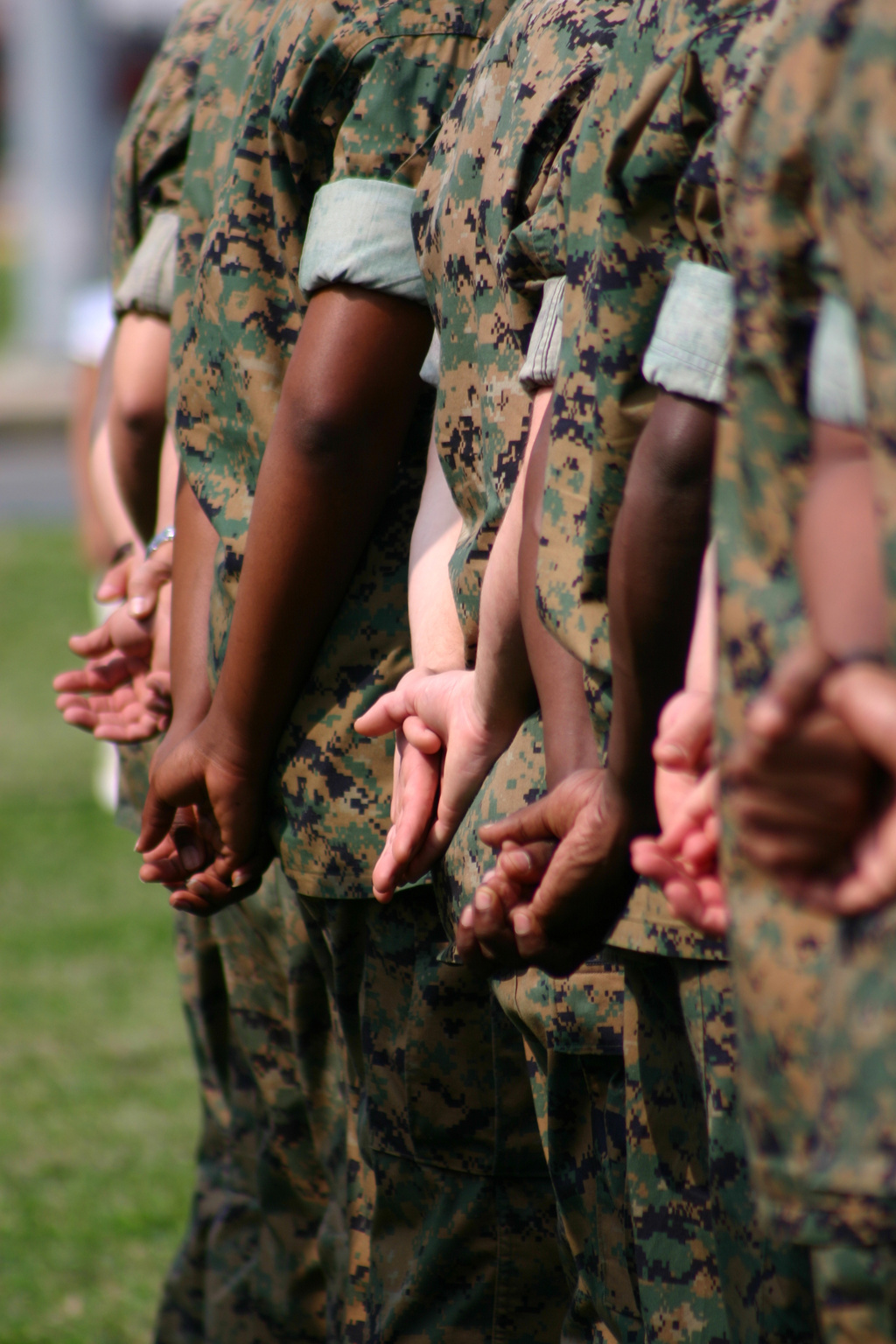
veteran founded, 501(c)(3) non-profit
wellness beyond the battefield
About the Organization
Jeremy Fusco and Robert Veigel
co-founded Set|Ready (S|R) in 2017
with the goal of forming an organization that would serve veterans and their spouses. Over the years S|R honed its mission to focus on wellness during and after the transition from military to civilian life.
S|R is launching their initiative
Operation SWELL: Support, Wellness, Education, & Lifelong Learning in 2022 which will provide wellness beyond the battlefield in the form of a virtual well-being coaching platform for military, veterans, and military spouses to receive integrated support for the military transition to civilian life.

About the Co-founders
Jeremy Fusco is a medically retired U.S. Air Force veteran and Licensed Clinical Social Worker with a private psychotherapy practice based in Dallas, TX. He works to advocate for fellow veterans and their families in the areas of mental health, access to care, and resource development.
Robert Veigel is a Licensed Master Social Worker from Virginia Beach, VA, with a decade of experience in program evaluation and research. He serves as the research specialist for Virginia Beach City Public Schools where he focuses on issues of academic programming, social-emotional learning, and equity.
Set|Ready Mission and Goals
Our Motto
Wellness beyond the battlefield
Goal
Preparing those who have served for their next mission.
To better the lives of military, veterans, and military spouses
What we believe
- S|R believes there are multiple aspects to a successful transition--mental health, physical health, financial, and social wellbeing.
- S|R embraces the diversity of military experiences, eras of service, and inclusion of all veterans
- S|R believes in the power of support networks and resources for military, veterans, and military spouses.
- S|R believes all individuals can contribute to the successful transition and wellness of veterans.
What we do
S|R empowers military, veterans, and military spouses through holistic support and coaching to ensure wellness beyond the battlefield.
Diversity, Equity, and Inclusion
S|R believes that all people and communities are deserving of support that uplifts and celebrates their identity as they are.
S|R has made equity central to the mission of serving all military, veterans, and military spouses inclusive of their own identities, values, and experiences.
S|R is aware of the need to improve the world we live in by providing services that match a person's identity and experiences.
It is central to our mission to ensure all who have served - in and out of uniform - receive equitable access and experiences with S|R.


Wellness beyond the battlefield, improving the lives of military, veterans, and military spouses.
Image by Amber Clay from Pixabay
Organization's Overview
Set|Ready (S|R) is a veteran-founded 501(c)(3) non-profit organization with the overall goal of improving the lives of military, veterans, and military spouses.
Co-founded by Jeremy Fusco, LCSW, and Robert Veigel, LMSW, in 2017.
S|R has taken measured steps to research and procure the technology needed to recruit, vet, and onboard volunteer wellness coaches and participants.
S|R was able to secure the infrastructure necessary through several fundraising events.
S|R has conducted various forms of outreach to fund the acquisition of necessary software and infrastructure through social media campaigns and targeted awareness efforts. These efforts field-tested the reach of S|R’s ability to connect with grassroots supporters and raise necessary start-up funds.
Through considerate planning and fiscally sound practices, S|R has successfully procured advanced technology with continued support and upgrades at one-time purchase costs. This is vital to the infrastructure and operations of S|R and includes the ability to leverage the technology to build:
- S|R Learning Management System
- S|R Video Conferencing & Coaching
- S|R Virtual Summits
- S|R Social Media Development & Management
- S|R Support Network
- S|R Email Marketing
Problem Statement
Over time a body of research and evidence* has emerged which paints a stark picture of some of the challenges associated with transitioning out of military service. In the United States, the support for modern-day military members transitioning to the civilian world has continued to improve; however, the current supports are not adequate to address the complex issues faced throughout the four stages of transition from the military to civilian life. These issues are not solely isolated to the service members but also extend to their spouses. The effects are not time-limited and can have repercussions for years.
There are many Federal, State, and county agencies as well as universities, colleges, corporations, and non-profit organizations addressing components of post-military transition with a focus on education and job preparation/placement. There are fewer agencies and organizations that work to promote holistic wellness, recreation, and camaraderie in a concerted effort to reduce veteran suicide, improve future outlook, and engage in positive social activities.
S|R has identified the lack of developed service offerings that take into account the holistic needs of military members, military spouses, and veterans throughout all phases of transition.
S|R has identified the military transition in four distinct periods:
- In-service
- Pre-Separation
- Post-Military
- Lifelong
Due to the limitations of current programming, S|R has developed and refined our keystone program Operation SWELL: Support, Wellness, Education, & Lifelong Learning to meet the needs of our participants.
Operation SWELL is a well-being coaching initiative for military, veterans, and military spouses. The supports offered by Operation SWELL are intentionally and thoughtfully designed to improve outcomes for military, veterans, and military spouses through all phases of transition.
*See Set|Ready information sheets for additional details
Operation SWELL is a virtual
well-being coaching platform created with the goal of providing integrated support for the military transition to civilian life
Operation SWELL was developed with an approach that envelopes the four realms of transition: Physical, Mental, Financial, and Social. This embraces a comprehensive and direct approach that ensures the intersectionality of needs are connected to each realm to form holistic success.

Operation SWELL
Onboarding
Scouts & Guides

Through active engagement with stakeholders,
the military community, and those involved with military transition,
we have identified the need for roles that capture the experiences, purpose, and intention of our Scouts (participants) and Guides (volunteers).
Scouts: On the path forward, vigilant, and determined to succeed.
Guides: Experienced, tactful mentors that assist along the path forward.
Enrollment Process
SCOUT (Military, Veterans, & Military Spouses)
Proceed to onboarding information
yes
Verification: Eligibility & Military Affiliation (Keybase)
Are they:
Military
Veteran
Military Spouse
Refer to coaching enrollment & support opportunities
start
NO
Wellness beyond the battlefield:
-Physical
-Mental
-Financial
-Social
Matchmaker:
Preferences
Focus Areas
Assess Goals
Learn:
Purpose & Intention Modules
GUIDE (Volunteers & Coaches)
start
Are they:
Military
Veteran
Military Spouse
yes
NO
Proceed to onboarding information
Verification: Eligibility & Military Affiliation (Keybase)
NO-GO
Background Check
Cleared
Wellness beyond the battlefield:
-Physical
-Mental
-Financial
-Social
Matchmaker:
Preferences
Knowledge Areas
Learn:
Purpose & Intention Modules
S|R Information Sheet
Transition Periods
IN-SERVICE
The in-service transition period is experienced while the service member is in uniform and lasts until the
pre-separation period begins around 18 to 24 months prior to separation. The service member and their family might experience frequent changes of duty location, job responsibilities, increased operations tempo, and deployments in support of humanitarian and national security initiatives.
PRE-SEPARATION
The next phase of transition leads to separation or retirement from military service. This is a time that is aided by the Transition Assistance Program (TAP) or its equivalent that begins 18 to 24 months prior to separation. Skills transference and education become the focus of service members and military spouses who face potential career changes if relocating post-military. Training for appropriate financial planning and budgeting to account for uncertainty in the civilian job market can be inadequate.
POST-MILITARY
The third phase (Post-Military) starts at the time of terminal leave from military service to approximately 36 months later. This is a time when the realities of post-military life come into focus and is often marked with increased difficulty in multiple areas. We highlight this period as its own period of significance as many will experience a shift in opportunities for employment, mental and physical health, and relationship dynamics.
LIFESPAN
The final phase of transition starts 36 months
post-separation from military service and continues throughout the rest of the lifespan. This period of time is not focused on as it is well outside of the focus of the initial post-military transition which is career-oriented and limited in scope. This is a time of assumed normalization that can lead to unhealthy coping mechanisms, apathy towards pursuing opportunities to improve career, well-being, and financial stability.
S|R Information Sheet
U.S. Veterans Population by State
1
28,928
1,659,401
U.S. Veterans Demographics:
Black - 12.7%
Indigenous American - 0.8%
Asian - 1.8%
Native Hawaiian/Pacific Islander - 0.2%
Two or More Races - 2.4%
Hispanic - 8.2%
White - 74.8%
S|R Information Sheet
Challenges faced by military, veterans, and military spouses include: Part I
CAREER
Career challenges faced by military, veterans, and military spouses can include:
career stagnation, opportunity loss, unrealistic expectations, education attainment, vocational certification, and lack of community.
- The veterans unemployment rate is currently at 6.5%, which is roughly 581,000 veterans looking for employment.
A report from the Center for Innovation and Research on Veterans and Military Families (CIR) found that veterans may have:
- Issues adapting to civilian work culture due to the continuation of military identity
- Unrealistic job expectations and difficulty translating military experience to civilian employment due to a lack of preparation during transition.
- Barriers to finding and sustaining employment due to unaddressed mental health and/or substance abuse issues.
In an article published by Deloitte they report that military spouses are:
- More likely to be female (92%)
- Under the age of 40 (80%)
- 45% of military spouses hold bachelors or advanced degrees
- Military spouses face staggering unemployment (24%)
and underemployment (31–51%).
3
2
4
MENTAL HEALTH
In the area of mental health, issues faced by military, veterans, and military spouses can include: impostor syndrome, suicidality, PTSD, TBI, anxiety, depression, insomnia, family & relationship dynamics, undiagnosed/underdiagnosed/unreported symptoms, isolation, operations tempo - sustained wartime operations since 2001.
- The average number of Veteran suicides per day rose from 16.6 in 2005 to 17.6 in 2018.
- 20 percent of the vets who served in either Iraq or Afghanistan suffer from either major depression or post-traumatic stress disorder. 19.5 percent of vets in these two categories have experienced a traumatic brain injury.
5
6
S|R Information Sheet
Challenges faced by military, veterans, and military spouses include: Part II
Physical Health
Physical health issues experienced by veterans are varied but can include: chronic pain, sleep apnea, neurological, hearing health, obesity, lack of physical activity, and limited mobility. Additionally, there are certain issues associated with specific service eras such as:
Operation Enduring Freedom (Oct 2001 - Present)
Health problems from toxic chemicals or other hazardous materials - burn pit smoke; depleted uranium; and sand, dust, and particulates.
Additional injuries from extreme temperatures, toxic embedded fragments, explosions, and noise.
Iraq War - Operations Iraqi Freedom and Operation New Dawn
(March 19, 2003 - Dec 15, 2011)
Health problems from toxic chemicals or other hazardous materials - Burn pit smoke; depleted uranium; sand, dust, and particulates; sulfur fire; chemical warfare agents; and chromium.
Gulf War - Operation Desert Shield and Desert Storm
(August 2, 1990 - present)
Health problems from toxic chemicals or other hazardous materials - oil well fires; depleted uranium; sand, dust, and particulates; chemical and biological weapons; Chemical Agent Resistant Coating (CARC) paint; and pesticides.
Vietnam War
(Nov. 1 1965 - April 30, 1975)
Health problems from toxic chemicals or other hazardous materials - diseases related to Agent Orange, Hepatitis C, and hearing problems caused by noise.
7

THANK YOU!
The purpose of our work at S|R is to serve the military, veterans, & military spouse community.
Your support provides a meaningful impact that contributes to the holistic wellbeing of military, veterans, & military spouses throughout their journey from military to civilian life & beyond.
All services are provided at no cost to military, veterans, & military spouses.
Endnotes
- https://www.va.gov/vetdata/veteran_population.asp
- https://www.bls.gov/news.release/vet.nr0.htm#:~:text=Highlights%20from%20the%202020%20data,6.7%20percent%20for%20female%20veterans
- https://cir.usc.edu/wp-content/uploads/2015/05/CIR-VOA-Report-FF.pdf
- https://www2.deloitte.com/us/en/insights/industry/public-sector/military-spouse-unemployment.html
- https://www.mentalhealth.va.gov/docs/data-sheets/2020/2020-National-Veteran-Suicide-Prevention-Annual-Report-11-2020-508.pdf
- https://nvf.org/veteran-mental-health-facts-statistics/
- https://www.va.gov/health-care/health-needs-conditions/health-issues-related-to-service-era/
www.setready.org